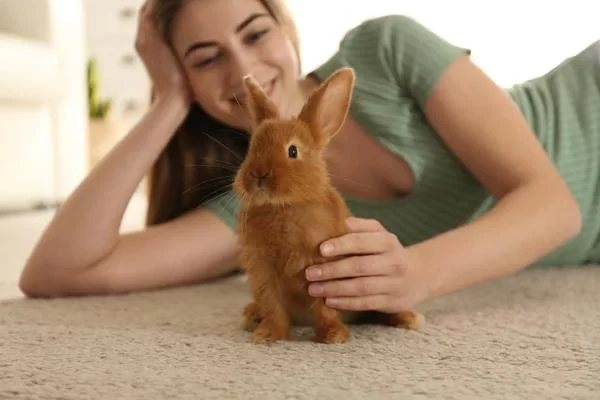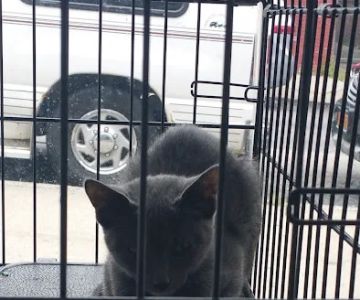How to Care for a Senior Pet Rabbit: Essential Tips and Advice
- Understanding Senior Rabbits and Their Needs
- Adapting Your Rabbit's Diet for Their Golden Years
- Health Checks and Vet Visits for Older Rabbits
- Providing Comfort and a Safe Environment for Senior Rabbits
- Grooming Tips for Older Rabbits
- Expert Advice from Hidden Brook Veterinary
1. Understanding Senior Rabbits and Their Needs
As rabbits age, their needs change significantly. Senior rabbits (typically over 5 years old) experience physical and behavioral shifts that require specific care. These changes might include a decrease in energy, changes in diet preferences, or even mobility issues. Understanding these changes is the first step in ensuring that your bunny enjoys a happy and healthy life in their golden years.
Senior rabbits are more prone to health problems such as dental issues, arthritis, and digestive problems. This is why it's crucial to monitor their behavior closely and make adjustments to their care routine to ensure they live comfortably.
2. Adapting Your Rabbit's Diet for Their Golden Years
As rabbits age, their metabolism slows down, which can lead to changes in their dietary needs. It's important to adjust their diet to ensure they get the right balance of nutrients without overfeeding. Senior rabbits may also experience a decrease in appetite due to dental issues, so providing soft or grated food can make eating easier for them.
2.1 Hay and Fresh Vegetables
Hay remains a staple in a senior rabbit’s diet, as it promotes dental health and proper digestion. However, you might need to offer softer varieties if your rabbit is struggling with chewing. Fresh leafy greens are also an excellent choice to supplement their diet with vitamins and minerals.
2.2 Special Rabbit Pellets
Choose high-quality senior rabbit pellets that are formulated for older rabbits. These pellets are often lower in protein and calcium to prevent kidney and bladder issues, which are common in senior rabbits.
2.3 Avoiding Sugary Treats
While treats are always fun, sugary snacks can lead to obesity and other health problems in senior rabbits. It's best to limit sugary treats and focus on healthy alternatives like fresh herbs or small pieces of fruits.
3. Health Checks and Vet Visits for Older Rabbits
Regular health checks become even more important as your rabbit ages. Senior rabbits are at a higher risk for certain conditions like arthritis, heart disease, and dental problems, so frequent vet visits are crucial. At least one checkup per year is recommended, but more frequent visits may be necessary for rabbits with ongoing health concerns.
3.1 Dental Care
Rabbits’ teeth continuously grow throughout their lives, and older rabbits are more likely to develop dental problems. Regular dental checkups can help catch issues like overgrown teeth or misalignments before they cause significant problems.
3.2 Mobility and Arthritis
Arthritis is a common condition in senior rabbits. If you notice your bunny is having trouble hopping around or is reluctant to move, consult your vet. There are treatments available to ease their discomfort, and providing a soft, warm resting place can help them stay comfortable.
4. Providing Comfort and a Safe Environment for Senior Rabbits
As your rabbit ages, their living environment should be adjusted to ensure they are comfortable. Senior rabbits may experience a decrease in mobility, so it’s important to provide easy access to food, water, and litter boxes. Keep their living space quiet and calm, away from loud noises or other pets that may stress them out.
4.1 Soft Bedding
Soft bedding is essential for older rabbits, especially those with joint pain or mobility issues. Choose bedding that is gentle on their joints and easy for them to move around on. Fleece blankets or cushioned mats work well.
4.2 Accessible Spaces
Ensure that your rabbit can easily access their food, water, and litter box. Low-sided litter boxes are ideal for senior rabbits who may struggle with jumping. You can also provide ramps or low platforms to make it easier for them to reach their favorite spots.
5. Grooming Tips for Older Rabbits
Grooming is important for all rabbits, but it becomes even more crucial as they age. Senior rabbits may have trouble grooming themselves properly due to arthritis or other mobility issues. Regular grooming can help prevent matting in their fur and ensure their skin stays healthy.
5.1 Brushing
Brush your senior rabbit’s fur regularly to remove loose hair and prevent hairballs, which can lead to digestive problems. Long-haired breeds may need more frequent brushing, while short-haired rabbits require less. Be gentle when brushing to avoid hurting their skin.
5.2 Nail Clipping
As your rabbit ages, their nails may become more brittle and harder to trim. If you're unsure how to trim your rabbit’s nails safely, consider seeking advice from a vet or professional groomer.
6. Expert Advice from Hidden Brook Veterinary
At Hidden Brook Veterinary, we specialize in the care of senior rabbits. If you have concerns about your aging bunny’s health, diet, or overall well-being, we’re here to help. Our team offers personalized care plans to ensure your pet’s comfort and longevity.
If you’re unsure of what adjustments to make for your senior rabbit’s care, contact us today for a consultation and tailored advice on how to make their golden years as comfortable as possible.












